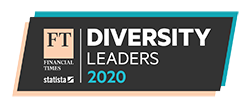To target real diversity, ask the workers

Roula Khalaf, Editor of the FT, selects her favourite stories in this weekly newsletter.
Booking.com, the Dutch-headquartered travel company, has come top for workplace diversity and inclusion in a new ranking of European employers by the Financial Times and research partner Statista, followed by American consumer goods multinational Colgate-Palmolive, and Willmott Dixon, a British family-owned building group.
Unlike existing rankings, which highlight companies that are good workplaces for women or a particular minority, this list examines inclusion holistically.

Explore the FT’s inaugural Diversity Leaders ranking of 700 companies here.
See the rest of the report here
Companies are feeling the pressure to look at how their businesses affect both society and communities, and one way to measure that is to look at how they treat their staff.
“Diversity is like sustainability in this respect. If you take decisions with a long-term view, it must be better than being focused on quarterly reporting,” says a senior female executive at a global European services business.
Inclusion is also being seen as a way to boost performance, with studies by McKinsey, among others, suggesting that groups with more diverse leaders and staff ultimately outperform. “Diversity unequivocally improves the likelihood of your team performing well,” says Vivian Hunt, managing partner of McKinsey in Britain and Ireland.
The 700 companies included in the ranking are workplaces praised by their employees for their inclusion efforts. Some, like top-ranked Booking.com, which is owned by US-based Booking Holdings, do particularly well on ethnicity; Colgate-Palmolive, the second-placed group, stands out for gender issues, while Willmott Dixon, which is ranked third, wins praise for both ethnicity and age. All three score highly in many categories.
Statista surveyed 80,000 people working for up to 10,000 companies in 10 European countries to find 700 groups that were rated especially highly for diversity by their employees and industry peers. To be eligible, companies had to employ at least 250 people. The definition of diversity was broad, encompassing age, gender, ethnicity, disability, sexual orientation and general diversity, and the answers from female and older workers and members of minority ethnic groups were given extra weight.
While specific human resources policies matter, such efforts are also “about making individuals feel valued and wanted, every day that they’re there, even if they have difficult times”, says Elizabeth Corley, chair of the Impact Investing Institute.
The rankings do not include a company’s gender pay gap or the share of women or ethnic minorities on a company’s board. This is partly because disclosure varies by country, which makes comparisons difficult. Statista also argues that the composition of the board is not for now a suitable indicator of how a company treats its staff day to day, something activists pushing for diverse boards, including the 30% Club in the UK and Catalyst in the US, would sharply disagree with.
As companies across Europe try to improve inclusion, some find they have particular challenges or advantages depending on where they are based. The Netherlands is attractive to many employees because so much of the population and business sector is fluent in English and the country gives favourable tax treatment to multinational companies.
In turn, multinationals have access to a wider, international pool of talent, which helps their ability to be diverse and inclusive. In contrast, Switzerland struggles with insularity and a lack of gender equality, perhaps unsurprisingly in a country where women only gained the right to vote in federal elections in 1971.
Up to three years ago surveys in Germany found that more than half of companies felt no need to improve diversity with regard to gender or sexual orientation. The country’s shining light is Infineon, the semiconductor group, which is fourth in the rankings. More generally, German attitudes are starting to change because of labour shortages.
In France consumer-facing groups such as Biocoop, Groupe Rocher and Sephora do particularly well in the rankings, yet only one member of the CAC 40 index has a female chief executive. France has followed the UK in requiring gender pay gap reporting. But, as Marlène Schiappa, secretary of state for equality, argues, more work is needed. Otherwise, according to World Economic Forum, the sexes will not reach parity worldwide until well into the 23rd century.
Some sectors face specific challenges and German industry has trouble attracting diverse workers. This is in contrast to the European financial sector where recruitment is close to gender parity and includes more ethnic minorities. Retention is a struggle, however, and Oliver Wyman, a consulting firm, estimates that just 20 per cent of executives are women. Progress will continue only if non-traditional recruits feel welcome and valued, which is what the new FT/Statista ranking tries to capture.
“To make diverse teams work, you need investment in people managers [and] in the emotional safety for people,” says Elizabeth Uviebinené, author of Slay in your Lane, but you need people with the right skills. “Not everyone is suited to managing teams and the workplace is only going to get more diverse.”
Comments